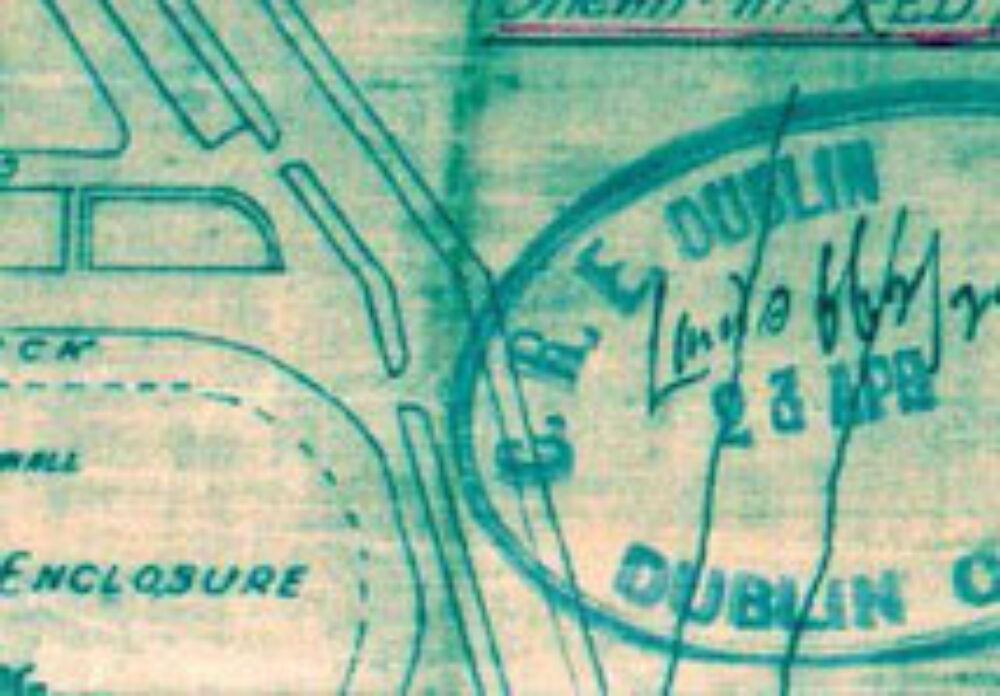In 2010, following a major survey of the MPD collection, it was decided to digitise as many of the sheets (the vast majority of which are A0 in size), in order to both preserve wear and tear on the originals and to provide greater access through electronic means and the internet in particular. The sheets were stored rolled in large cardboard tubes, access to them was difficult and there was no electronic finding aid (database). Give the scope of the project, it was decided to run a tender competition to source a company capable of achieving the task given a limited budget and the requirement to work in close cooperation with professional archivists from Military Archives. E-Docs, a company based at the Kylemore Road, Dublin, won the tender competition. Following a period of research into international best practice, it was decided to achieve the following:
- To remove the sheets from the tubes and place them flat
- To digitise (‘scan’) each sheet at high quality
- To create a database of these digitised sheets
- To release a portion of the sheets online on the Military Archives website
The project was divided into the following stages:
Phase 1:
Stock-checking of the entire collection, which ultimately exceeded 2,000 individual sheets, some in fragile condition.
Phase 2:
Drawing up of specifications and a request for tender documents. Site visits with potential tenderers to explain the project
Phase 3:
Award of tender. Stock-checking and relocation of the MPD collection to a secure facility at E-Docs Ltd.
Phase 4:
Archival preservation measures: Each sheet was gradually ‘relaxed’ in its new environment, carefully flattened, digitised and then placed in specially designed acid-free portfolio enclosures, with an inter-leaving of alkaline-buffered acid-free tissue paper. The enclosures were individually bar-coded for ease of retrieval and placed flat in map drawers.
Phase 5:
Digitisation. It was decided to follow the best archival practice of creating a ‘preservation master’ digital surrogate in TIFF format and then ‘access copy’ surrogates in PDF format. Should anything ever happen the hard-copy originals, the preservation masters (which are stored offsite in a fire-proof safe) have preserved the greatest possible level of detail. The original sheets were scanned at 800dpi lossless compression, in 24bit RGB. This has resulted in an access copy that allows for zoom functionality that will greatly assist research. The access copies provided on the internet are of a lower quality (depending on the user’s chosen download quality) and are copyright to Military Archives — please see our FAQ page for more details.
Phase 6:
Creation of a database. Each sheet was examined by archivists from Military Archives and relevant information to enable a search (for example location, British/Irish name, date, other keywords) was captured and reviewed. E-Docs created a ‘web-ready’ database which allows for dynamic viewing of the digitised images for each location, an advanced search function and added features such as mapping on open-source online ‘Google’ mapping software (the coordinates for each location will be added in time).
Phase 7:
Launch of the collection online and in the reading room at Military Archives. To coincide with the launch of www.militaryarchives.ie in December 2011, it was decided to make the first 650 sheets of the MPD collection available. For security reasons, this online release did not include any currently occupied military installations.
Phase 8:
Researchers who book an appointment in Military Archives can view the digital images in the reading room through a large monitor, which allows for full panning and zooming across the images. The paper originals can be made available by special request (please indicate in advance), subject to preservation requirements.
Phase 9:
The vast majority (3950 sheets out of approximately 4000) are now available online for searching on www.militaryarchives.ie. While a number of images are available relating to barracks that are in active use, there would still be a selection held back for security reasons.

